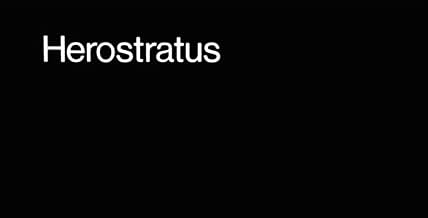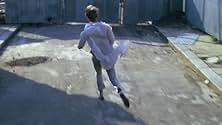When young poet Max (Michael Gothard) hires a marketing company to turn his suicide-by-jumping into a mass-media spectacle, he finds that his subversive intentions are quickly diluted into a... Read allWhen young poet Max (Michael Gothard) hires a marketing company to turn his suicide-by-jumping into a mass-media spectacle, he finds that his subversive intentions are quickly diluted into a reactionary gesture, and his motivations are revealed as a desperate attempt to seek atte... Read allWhen young poet Max (Michael Gothard) hires a marketing company to turn his suicide-by-jumping into a mass-media spectacle, he finds that his subversive intentions are quickly diluted into a reactionary gesture, and his motivations are revealed as a desperate attempt to seek attention through celebrity.
- Director
- Writers
- All cast & crew
- Production, box office & more at IMDbPro
Featured reviews
Interesting forgotten artifact of British cinema
Max (Michael Gothard), is a struggling poet. He is agonised by society around him, and like Travis Bickle in the later film Taxi Driver (1976), he foments a distinctive hatred whilst holding up alone in a disheveled flat in a distorted, crumbling London. But unlike Bickle, Max's ideas are motivated by fame. He proposes to a marketing executive, Farson (Peter Stephens), an offer he cannot refuse. Max will publicly kill himself by jumping off of a tall building, and the advertising company can own this commodity, and do whatever they please with it. The machinations of the marketeers begins, as they attempt to come up with adequate exposure for the death-as-entertainment, subversive performance art piece. The silence that preceded Max's encounter with Farson, is perfectly highlighted in a line from Albert Camus, in his book 'The Myth of Sisyphus': An act like this (suicide) is prepared within the silence of the heart, as is a great work of art. As the workings of the sadistic minds of advertisers is quietly taking place in the background, Max begins a relationship of sorts with Farson's secretary, Clio (Gabriella Licudi), with devastating consequences.
As a commodity, Max is used, humiliated, and displayed as despicable for his desperate attempt at using his death for fame and immortality. The title of the film is taken from a character from ancient Greece who wanted immortality; which he gained by setting fire to the Temple of Artemis. The film is most certainly relevant today with our wealth of deluded people, hungry for fame with no substance. Fame has itself become a commodity: We are in an age of fame that is hinged on one act; one single moment. And like the fame that Max is attempting to gain, it is also very fleeting.
The films technical brilliance is in its editing, a process that took Levy two years to perfect. Levy approached editing like science (he did have a PhD in Experimental Physics). The film is littered with subliminal images. Short sequences of static shots, obscure imagery, and images of animal slaughter. The latter of these are often used to juxtapose with images of a female stripper. The snippets also seem to appear, not just as fractured images of a deranged mind, but also almost synonymous with televisual adverts themselves. Almost self contained. In one, a very young Helen Mirren (uber-MILF) seduces the camera and its audiences, stating that you want her. The use of jump-cuts and long takes is reminiscent of the then new European movements, mostly evoking some of the work of Godard and Antonioni.
It's an interesting piece of forgotten cinema. As with many art-house films of this type, it is highly pretentious. But it is watchable pretension. It's idea does not really carry throughout the film, and it could have gone in more interesting angles. But this could perhaps be just an opinion from today's perspective: Marketing has certainly become more all-pervasive since the late 1960's. As a closing statement, it is ironic that later, both Don Levy and Michael Gothard ended their lives by suicide. The film remains though, and is at times visually arresting. Classic? No. But as an artifact of British '60's cinema, it is a delight.
www.the-wrath-of-blog.blogspot.com
You'll never see a film like it
Written and directed by Don Levy, it was the only full-length film he ever made and it is a long (142 minutes) and slow work distinguished by its innovativeness and opacity. The narrative is pretty minimal and therefore can be briefly stated: a very angry young man called Max (Michael Gothard) decides he has had enough of life and offers an advertising company the opportunity to exploit his public suicide. This explains the erudite title: Herostratus was an Ancient Greek arsonist who destroyed the Temple of Artemis, one of the Seven Wonders of the Ancient World, and his name has become a metonym for someone who commits a criminal act in order to become famous.
The film looks and sounds amateurish and indeed had a tiny budget (but took six years from conception to completion). However, clearly Levy wanted some of the dialogue to be hard to hear and some of the scenes to be difficult to watch. One of the most startling and memorable sequences inter cuts the dancing of a sexy woman with the butchering of a dead animal and one of the most inexplicable (but again memorable) images is of a parasol-carrying woman clad in black with a white face. This is a work full of odd interjections ranging from the voice of the elderly Malcom Muggeridge to a near-wordless burlesque by a very young Helen Mirren in her first film role. There are extracts from semi-contemporary newsreels scattered about the film which seem to be inviting us to question what kind of world we have created.
Seeing "Herostratus" after such a long interval and at the more mature age of 66, I found that I was less tolerant of the pretentiousness of the whole thing but still captivated by the bewildering images. Also I was disturbed to read after the viewing that both the director and the lead actor subsequently committed suicide.
Herostratus
Like others who have written here about HEROSTRATUS, I too saw this amazing and unforgettable film in the early 70's. I have subsequently longed to see it again.
This film is what I like to call "transformative" cinema. Tranformative in the way the films of Bergman, Pasolini, Godard & DaSica can be. You may detest this film. But, you will not easily forget it.
I'd also like to say that if you like the novels of J.G.Ballard, particularly the books of the 70's, you will probably appreciate this film. I've always considered it particularly "Ballardian". This film grabs corporate capitalism by the throat. Yes, it is cynical.
I am happy to report that Herostratus is now available on DVD. It can be obtained at Amazon UK.
cinematic surrealism, scientifically conceived, that often communicates like music
The film is remarkable not only for its very high visual quality (often on the level of the best of Antonioni and Tarkovsky) and for its sometimes innovative relations of sound and image, but also for the attitude and working method of the director: a highly personal and historically deeply rooted concept of surrealism, linked to the scientific method, that shapes the stream of consciousness woven into the narrative into something close to visual music.
I had the opportunity to see this film twice in the 1970's, and thirty years later, images are still vividly present. I'll mention just two: first, the black-clad woman (Ines Levy) lighted from behind, face painted white, carrying a black parasol, seen either slowly stalking out of an alley towards the viewer, or standing on a rooftop, viewed from below, recalling for me drawings by Hans Bellmer. Second, the lengthy hyper-violent sequence in which the protagonist demolishes his paraphernalia-packed apartment. A swaying suspended doll stands out within the jagged rhythms of the editing and will much later in the film be flashed into another key sequence: one example for the rich network of associations that go far beyond story-telling structures. On the soundtrack during the demolition: one of the virulent fugues from Beethoven's MISSA SOLEMNIS.
The film's female lead is named Clio, and CLIO is, in Greek mythology, the muse of history.
HEROSTRATUS does have some flaws, but is by any applicable standards a work of depth and integrity. Had it received more extensive distribution, it might have turned out to be a key film of the late 1960's. It's to be hoped that current plans for a commercial DVD release will soon bear fruit and that this film will receive the (belated) recognition that it richly deserves.
An extraordinary film, in a category of its own.
I have never been more moved by a film. I can compare it only to such transforming experiences as seeing L'Avventura in the early 'sixties, although the art of Herostratus is far more mysterious. The mystery is compounded by the great gulf of years that separates me from that screening, by the fact that almost nobody I meet has seen it or even heard of it, and by the apparent lack of any body of explication and commentary.
Without seeing it again I wouldn't attempt a precis of the plot, but what remains in memory is the cool classicism of the narrative(innocence vs. worldliness and levels of manipulativeness that Henry James might have appreciated) as mediated through an unobtrusive but arresting surrealism of technique.
It's been 35 years--I'd really like to revisit Herostratus.
Did you know
- TriviaHelen Mirren's debut.
- ConnectionsEdited from Nazi Concentration and Prison Camps (1945)
- How long is Herostratus?Powered by Alexa
Details
- Runtime
- 2h 22m(142 min)
- Color
- Sound mix


























